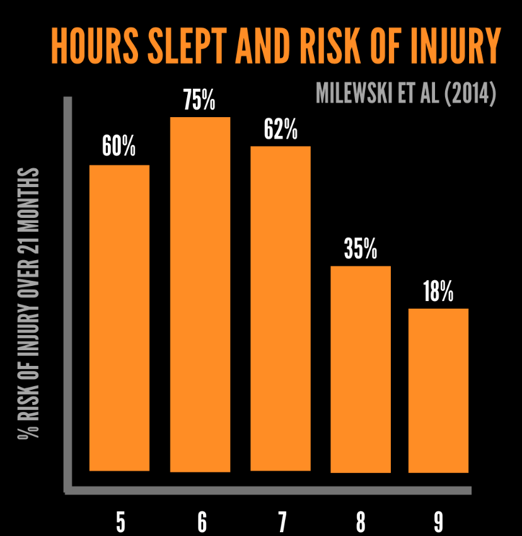In the world of sports, athletes are constantly looking for ways to enhance their performance and stay at the top of their game. Training, nutrition, and skill development often take the spotlight, but there's one crucial factor that is often overlooked: sleep. The connection between sleep and injury risk is profound and often underestimated. In fact, studies and data show that the amount of sleep an athlete gets has a direct impact on their risk of injury, recovery, and overall performance.
In this blog, we’ll explore why sleep is so essential for athletes and how the number of hours they sleep each night can make or break their performance and health.
The Link Between Sleep and Injury Risk
The importance of sleep for athletes goes beyond feeling rested. Sleep is a fundamental aspect of physical recovery, mental clarity, and injury prevention. Athletes who are sleep-deprived are more prone to accidents, muscle fatigue, and poor decision-making, all of which increase their risk of injury.
The following graph (provided below) illustrates the relationship between sleep duration and injury risk in athletes:
- 5 hours of sleep: 60% injury risk
- 6 hours of sleep: 75% injury risk
- 7 hours of sleep: 62% injury risk
- 8 hours of sleep: 35% injury risk
- 9 hours of sleep: 18% injury risk

As you can see, the injury risk is significantly higher for athletes who sleep less than seven hours per night. For example, athletes who sleep only five hours a night have a staggering 60% increased risk of injury. The data also shows a marked improvement in injury risk as the hours of sleep increases. Athletes who get eight or nine hours of sleep enjoy a dramatically lower injury risk — 35% and 18%, respectively.
Why Sleep is Crucial for Athletes
Understanding the relationship between sleep and injury risk is just the beginning. Let’s dive deeper into why sleep is so important for athletic performance and health.
1. Recovery and Muscle Repair
When athletes train intensely, their muscles undergo microscopic tears. These tears are repaired during rest, primarily during sleep, leading to muscle growth and enhanced strength. Sleep is when the body produces growth hormone, which is vital for muscle repair and tissue regeneration. Without adequate sleep, recovery is compromised, leading to muscle fatigue, delayed recovery, and an increased risk of overuse injuries.
2. Mental Sharpness and Decision-Making
Sleep isn’t just about physical recovery; it’s also crucial for cognitive function. Athletes need to make quick decisions, stay focused, and react with precision during games or competitions. Sleep helps improve reaction time, attention span, and decision-making abilities. Sleep-deprived athletes may experience slower reflexes and impaired judgment, increasing the likelihood of injury or poor performance.
3. Immune System Support
Sleep plays a significant role in boosting the immune system. During deep sleep, the body strengthens its defenses, helping to fight off illness and reduce inflammation. For athletes, staying healthy is essential for consistent performance, and a compromised immune system due to lack of sleep can lead to frequent illnesses or long recovery times after injury.
4. Injury Prevention and Resilience
Perhaps most importantly, sleep helps athletes remain resilient and avoid injuries. When athletes get enough sleep, their muscles, joints, and tissues are better prepared to handle the physical stress of training and competition. Without sufficient sleep, athletes become more prone to chronic fatigue, poor coordination, and overuse injuries. Sleep also helps balance hormone levels, including cortisol, which plays a role in the body’s stress response. Chronically high cortisol levels, often a result of inadequate sleep, can increase the risk of injury and slow the healing process.
Why 7 Hours of Sleep Can Be Riskier Than 5 Hours
It may seem surprising, but 7 hours of sleep can actually carry a higher injury risk than just 5 hours of sleep. Here's why: While 5 hours of sleep leads to immediate sleep deprivation, 7 hours might not allow enough time for the body to fully repair itself. Athletes who sleep for 7 hours might be getting less deep, restorative sleep compared to those who sleep 8 or 9 hours, leading to incomplete recovery. This can leave muscles and joints less resilient, increasing the likelihood of injury.
In contrast, those who sleep only 5 hours might experience more acute fatigue, but their bodies are in a heightened state of alertness, potentially reducing the risk of injury in the short term. This doesn’t mean that 5 hours is ideal, but the data suggests that 7 hours might leave the athlete in a state of cumulative fatigue, where their muscles, joints, and nervous system haven’t fully recovered. Essentially, while it’s not as damaging as 5 hours, it may not be enough to restore the body and reduce injury risk as much as 8 or 9 hours would.
The Impact of Sleep Deprivation on Athletic Performance
Sleep deprivation doesn’t just increase the likelihood of injury; it also negatively impacts performance. Athletes who don’t get enough sleep may experience:
- Decreased endurance: Fatigue sets in more quickly, reducing overall stamina and energy.
- Slower reaction times: Sleep deprivation impairs motor coordination and reflexes, leading to sluggish reactions.
- Reduced strength: Without proper rest, muscles are less capable of generating the power needed for peak performance.
- Mood changes: Lack of sleep can cause irritability, anxiety, and reduced motivation, affecting mental toughness. These factors can all contribute to decreased performance and a higher risk of injury, making sleep an essential aspect of any athlete’s training regimen.
Prioritize Sleep for Optimal Performance and Injury Prevention
As we’ve seen, sleep is not just a time for rest — it’s an essential component of an athlete's training and recovery cycle. Athletes who prioritize getting 7–9 hours of sleep each night reduce their risk of injury, enhance recovery, and improve overall performance. On the other hand, those who sleep less are more vulnerable to muscle fatigue, mental lapses, and increased injury risk.
With the data showing how injury risk rises dramatically for those who sleep fewer than seven hours a night, it’s clear that sleep should be a non-negotiable part of every athlete’s routine. Coaches, trainers, and athletes themselves must understand the importance of sleep as a critical factor in long-term success. So, if you’re an athlete looking to take your performance to the next level, the first step might just be getting a good night’s sleep. Your body and mind will thank you.

